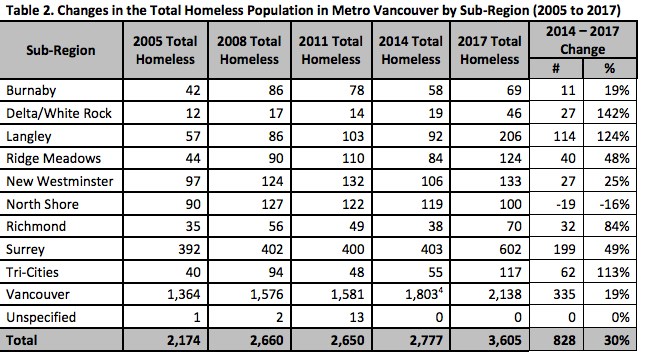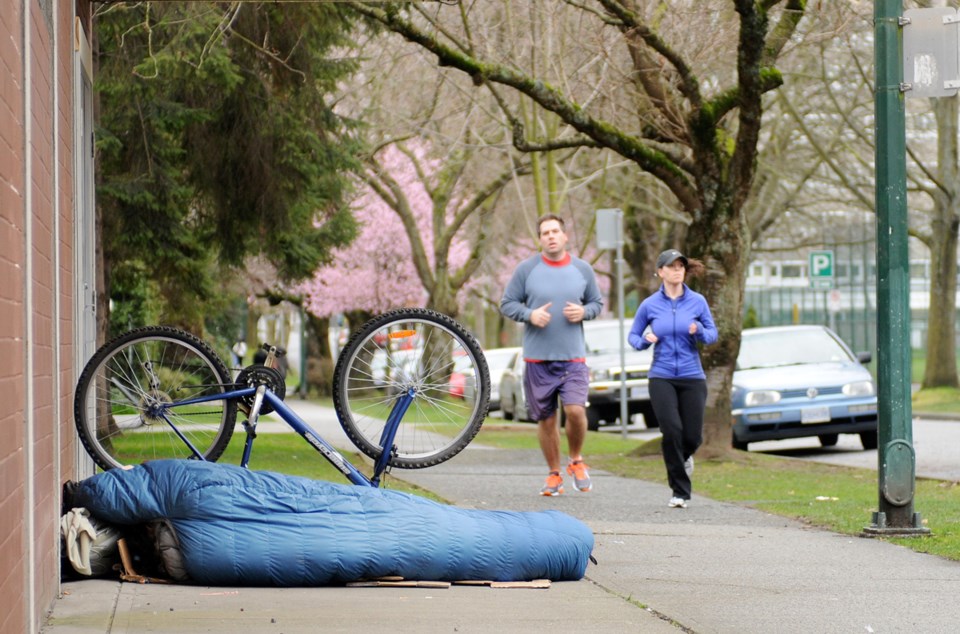The homeless population in Vancouver has increased by almost 800 people in 12 years and leads the region with 2,138 people either living on the street or in some form of shelter.
In the last year alone, the number of homeless in Vancouver shot up by 291 people to set a new record for homelessness in the city, according to preliminary statistics released Monday, April 10, by organizers of Metro Vancouver's homeless count, which was conducted over two cold and snowy days in March.
"It's completely horrifying to see these numbers — and sad and embarrassing," said NPA Coun. George Affleck of the statistics that also show growing homeless populations in Surrey (602), Langley (206) and New Westminster (133).
Other Metro Vancouver cities also saw increases, particularly in the Tri-Cities, where the homeless population grew from 40 people in 2005 to 117 this year. Richmond increased from 35 homeless people in 2005 to 70 this year.

The North Shore was the only municipality whose homeless population held steady over the 12-year period, with 90 people counted in 2005 and 100 in 2017. Burnaby's homeless population has fluctuated, with a high of 86 in 2008 and is now at 69.
Of the 3,605 homeless people counted in the region this March, 2,573 were living in shelters (1,601 in Vancouver) and 1,032 were either on the street or residing in a vehicle (537 in Vancouver). It's a 30 per cent increase over statistics collected in Metro's last count in 2014. (Vancouver conducts its own count in between Metro counts.)

A record-breaking 1,847 homeless people were counted last year in Vancouver. Affleck said the increase of 291 people over last year is a worrying trend and a problem that needs all municipalities and senior levels of government to work together to build homes.
"I sound like a broken record — that this is not something Vancouver can solve on its own," said Affleck, who has repeatedly criticized Mayor Gregor Robertson for promising to end "street homelessness" by 2015 when he knew the goal was impossible.
Affleck said Vancouver needs to take "a harder line" with other communities to address homelessness. He singled out Burnaby, which does not have any shelters and has demolished older rental buildings.
At a news conference Monday, Port Moody Mayor Mike Clay echoed Affleck's comments about working together, saying the statistics clearly show homelessness is no longer concentrated to Vancouver. Clay is chairperson of Metro Vancouver's housing committee.
"This is hitting everybody in every community," he said, noting the social and financial costs of homelessness are substantial for municipalities outside Vancouver. "We're failing to protect our most vulnerable citizens and the problem will not get any better without systemic changes, smarter investment and better cooperation between all levels of government and stakeholders."
Clay reiterated much of what he and other mayors, including Robertson, said in February when they launched a campaign to pressure the provincial government to address homelessness.
The mayors released a "position paper" that made 12 recommendations, including building 3,000 units of transitional housing by 2019, increasing the $375 shelter rate for welfare recipients, adding services for Aboriginal peoples, creating a plan to tackle poverty and expanding home care for people with chronic health issues, mental illness and addictions.
Housing Minister Rich Coleman has repeatedly said that the ruling Liberal government has invested more in social and supportive housing than any other jurisdiction in Canada.
In the past decade, the provincial government funded 13 supportive housing sites in Vancouver that created more than 1,500 units across the city. The government also bought more than 25 single-room-occupancy hotels in Vancouver, funded temporary housing sites and shelters, and continues to offer rent supplements for low-income people.
"I don't think you can downplay what has been done — there's been significant investment that we're thankful for where it's working," said Clay in acknowledging the provincial government's investments in housing. "The efforts don't definitely go unnoticed, but there's just not enough... these [homeless] counts continue to rise."
A final report on Metro's 2017 count, which will include detailed analysis of demographics and trends, will be released in the summer. The initial analysis has shown Aboriginal peoples are once again overrepresented in the number of homeless people living in the region — 448 in Vancouver, 137 in Surrey.
The organizers acknowledged the statistics for the entire count do not represent all people who may be homeless in the region. Volunteers count people in shelters, transition and safe houses, hospitals, jails and detox facilities. People living in vehicles are considered "street homeless."



